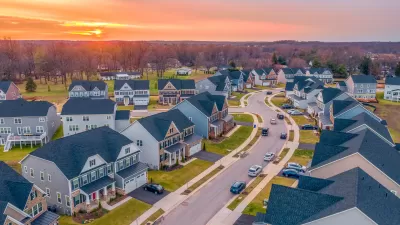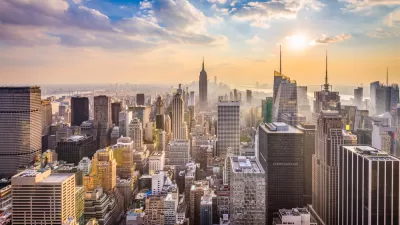If projections about remote work hold true, the resulting migration could shift economic centers, disperse housing market pressures, and transform the politics of small communities.

The lasting impact of remote work could alter the shape and character of U.S. communities, according to a piece by Jerusalem Demsas, as workers loosen their ties to physical offices and the power of economic clusters becomes dispersed across wider geographic areas.
As households with the means to relocate move to smaller, more affordable communities, they create new clusters of opportunities for businesses and services in their new homes. But the size of this shift will depend on how many companies decide remote work works for them. "For remote work to delink where people live from where they work, it’s likely not enough for just one biotech firm to decide its employees can work from home full time. A bunch of firms in that industry would need to make that shift," explains Demsas.
If predictions that 20 percent or so of American jobs will go remote holds true, it could lead to significant changes in how and where people live and work. As we've seen, the pandemic accelerated sharp spikes in housing costs in an already constrained housing market. "And while there has been some progress in recent years — notably on the West Coast — as of May 2021, the country has a shortage of about 3.8 million homes, with the problem concentrated in the metropolitan regions with the most valuable labor markets." Remote work could alleviate pressure on the housing market in these cities, spread out demand, and reduce prices in urban cores while raising costs in peripheral areas.
Reduced density, meanwhile, could have a negative impact on the climate. Even if people work fully remotely, many suburban and rural areas lack the walkability and public transit that makes car-free life possible in some major cities. Mitigating the effects of sprawl requires a reimagining of the suburbs as more mixed-use, walkable, and transit-oriented.
Further, Demsas writes that widespread remote work could also alter the political landscape of the U.S., where political leanings are currently closely tied to the density of the voter's home city. Demographic shifts could change the balance of voters in communities large and small, while housing pressures and cultural change could lead to tensions between longtime residents and newcomers.
Policymakers can help: "Localities have the opportunity to reduce the economic costs of newcomers and preemptively bring down the temperature by liberalizing their zoning laws and investing in market rate and affordable housing as well as enacting anti-displacement measures in order to reduce the conflict." By investing in local infrastructure, ensuring equitable access to job opportunities and housing, and improving public amenities, governments can help make the transition less shocking and more equitable.
FULL STORY: 3 ways remote work could remake America

Study: Maui’s Plan to Convert Vacation Rentals to Long-Term Housing Could Cause Nearly $1 Billion Economic Loss
The plan would reduce visitor accommodation by 25,% resulting in 1,900 jobs lost.

North Texas Transit Leaders Tout Benefits of TOD for Growing Region
At a summit focused on transit-oriented development, policymakers discussed how North Texas’ expanded light rail system can serve as a tool for economic growth.

Using Old Oil and Gas Wells for Green Energy Storage
Penn State researchers have found that repurposing abandoned oil and gas wells for geothermal-assisted compressed-air energy storage can boost efficiency, reduce environmental risks, and support clean energy and job transitions.

Santa Barbara Could Build Housing on County Land
County supervisors moved forward a proposal to build workforce housing on two county-owned parcels.

San Mateo Formally Opposes Freeway Project
The city council will send a letter to Caltrans urging the agency to reconsider a plan to expand the 101 through the city of San Mateo.

A Bronx Community Fights to Have its Voice Heard
After organizing and giving input for decades, the community around the Kingsbridge Armory might actually see it redeveloped — and they want to continue to have a say in how it goes.
Urban Design for Planners 1: Software Tools
This six-course series explores essential urban design concepts using open source software and equips planners with the tools they need to participate fully in the urban design process.
Planning for Universal Design
Learn the tools for implementing Universal Design in planning regulations.
Ascent Environmental
Borough of Carlisle
Institute for Housing and Urban Development Studies (IHS)
City of Grandview
Harvard GSD Executive Education
Toledo-Lucas County Plan Commissions
Salt Lake City
NYU Wagner Graduate School of Public Service





























